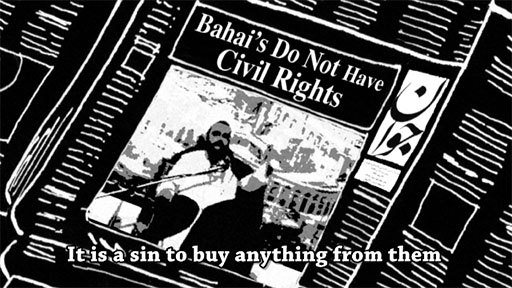 June 7, 2016—The International Campaign for Human Rights in Iran and Impact Iran released an animated video today calling for an end to the discrimination and incitement to hatred against members of the Baha’i faith in Iran.
June 7, 2016—The International Campaign for Human Rights in Iran and Impact Iran released an animated video today calling for an end to the discrimination and incitement to hatred against members of the Baha’i faith in Iran.
Click here to view video
The new video is being released on the heels of a spike in anti-Baha’i rhetoric by Iranian state media outlets and government affiliated clerics, which followed a meeting between Faezeh Hashemi, a prominent political figure and daughter of former president Hashemi Rafsanjani, and imprisoned Baha’i leader Fariba Kamalabadi on May 13, 2016. Kamalabadi was on furlough from prison at the time.
“Iran’s systematic persecution of Baha’is is fueled by a steady supply of hateful rhetoric from clerics and media bound to the state,” said Hadi Ghaemi, executive director of the Campaign. “Demonization of the Baha’is is needed to justify the human rights violations they are subjected to.”
According to the Baha’i International Community (BIC), since the May 13 meeting between Hashemi and Kamalabadi, “there has been an unprecedented number of anti-Baha’i statements across Iran, expressed in the official news media and on government-sponsored websites.”
The BIC reported that at least 169 clerics and state officials, including members of Iran’s Revolutionary Guard, Judiciary, and Assembly of Experts, have made public statements against Baha’is, calling members of the community “the enemy” and encouraging others to have “no contact with them.”
“It is greatly disturbing that arms of the state would incite hatred against any minority group,” said Mani Mostofi, director of Impact Iran. “This type of official rhetoric is closely linked to the ongoing policies of persecution and violence against Iranian Baha’is and other minorities.”
Impact Iran and the Campaign’s new animation tells the story of a young Iranian Baha’i as he is repeatedly exposed to defamatory speech, and shows how anti-Baha’i discourse translates into bigoted government policies.
The animation’s stunning visuals were the result of a collaboration between prominent Iranian artists, including internationally recognized illustrator Touka Neyestani.
Baha’is are one of Iran’s most persecuted minorities. In state media and government sanctioned religious gatherings, Baha’i are routinely called immoral, unclean, a deviant religious sect, spies, supporters of the former monarchy, and foreign agents. In Iranian law and practice, Baha’is face harsh restrictions on the right to practice their faith. They are denied access to higher education and regular employment and are routinely arrested for involvement in their religious community.
Fariba Kamalabadi and six other Iranian Baha’i leaders were arrested in May 2008 and sentenced to 20 years in prison each for administering the affairs of their community nationwide. They were convicted on charges of “espionage,” “propaganda against the state,” and “organizing and expanding an illegal group.”
In 2008, the UN declared the detention of these seven Baha’is illegal and a violation of human rights law, and the UN has repeatedly condemned the systematic discrimination against Baha’is in Iran.
Kamalabadi was on her first furlough after eight years in prison when Hashemi visited her home. Kamalabadi has since been returned to Evin Prison.
Hashemi, herself a former political prisoner, has been under intense criticism from state officials since the meeting but has defended her actions saying:
“I paid a visit to Ms. Kamalabadi because she was my cellmate. We lived together for six months,” she said in an interview with Euronews’ Persian service on May 15, 2016. “Meeting her when she was released on furlough for five days after eight years of imprisonment was a very ordinary thing. We aren’t animals who ignore moral and humanitarian obligations that are put on our shoulders at certain periods of our life.”
Faezeh Hashemi also described her time in prison as a “very valuable learning experience” adding, “We in Iran are committing injustice not only against [Baha’is] but against many others as well. But the level [of injustice] against [Baha’is] is worse than all others. This should not be happening. We must change our behavior.”
“The state’s anti-Baha’i rhetoric is aimed a recruiting ordinary Iranians into its discriminatory system but more people are seeing through the propaganda,” said Ghaemi. “We hope this video, like Hashemi’s commendable actions, will prompt more people to find ways to make Iran a place of less discrimination and bigotry.”
Follow the Campaign on Facebook and Twitter
For the latest human rights developments in Iran visit the Campaign’s website
For interviews, contact:
Hadi Ghaemi at +1-917-669-5996, hadighaemi@iranhumanrights.org
